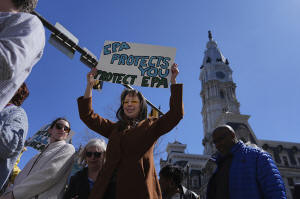Takeaways from scientists on the Trump administration's work on climate
change and public health
[August 27, 2025]
By SETH BORENSTEIN and MICHAEL PHILLIS
WASHINGTON (AP) — A Trump administration proposal to reverse a landmark
finding that climate change is dangerous to the public relies heavily on
a report from the Department of Energy that dozens of scientists say is
flawed.
The Environmental Protection Agency is seeking to use the DOE's work to
overturn the climate concept known as the “endangerment finding.” If the
administration succeeds, many laws and rules aimed at reducing or
restricting greenhouse gas emissions could be eliminated.
The Associated Press surveyed scientists for their views. Here are some
key takeaways from those who responded to AP's questions:
The work included some silly errors, but far more complaints were
about bias and distortion
The most common critique from 64 scientists who responded to questions
from AP was that the administration’s reports ignored, twisted or
cherry-picked information to manufacture doubt about the severity and
threat of climate change. Fifty-three of the 64 scientists criticized
the quality of the reports.
The Department of Energy report said Arctic sea ice has declined about
5% since 1980. That number is accurate for Antarctica, while Artic sea
ice actually declined more than 40% in the period.
Jennifer Marlon, director of data science at the Yale Program on Climate
Change Communication, highlighted a section on U.S. wildfires that
acknowledged that fire data from before 1960 isn't reliable for
comparisons. Yet the administration used that unreliable data in a chart
going back to 1920, leaving readers with the impression that wildfire
rates were higher many decades ago than they are now, Marlon said.

What scientists said was evidence of ‘cherry-picking’
Experts repeatedly said the reports were biased. Nineteen scientists
used variations of the phrase “cherry pick” to describe citations in the
administration reports.
Francois Bareille, a French economist, has done work concluding that
previous estimates about climate-related crop losses in French
agriculture were overly pessimistic. The administration’s reports cited
that work, but Bareille said it shouldn’t have because it’s wrong to
generalize his findings to other regions.
Climate scientist Zeke Hausfather said the reports pulled a single
figure from his work on climate modeling to build a case that the models
scientists use are often overly pessimistic. Hausfather said his
research actually concluded that climate models have performed quite
well.
He called the government’s process a “farce.”
[to top of second column]
|

Environmental Protection Agency employees and their supporters take
part in a national march against actions taken by the Trump
administration March 25, 2025, in Philadelphia. (AP Photo/Matt
Rourke, File)
 What do the report's authors and
the government say?
The authors of the report said any errors found will be corrected.
In a joint statement, authors of the Energy Department report said
the document clearly says it's not meant to be a comprehensive
review of climate science. Instead, the authors said, it's focused
on data and topics that the media and others have underreported and
overlooked.
A few scientists strongly back what's in the report
A handful of scientists contacted by AP spoke positively about the
report.
One expert cited in the work praised it, saying it departed from
unnecessarily alarmist findings of other national and international
climate assessments.
James Davidson, a professor at the University of Exeter focused on
economics, has published work that disputes the mainstream consensus
that rising carbon dioxide levels in the past caused warming.
He said the Department of Energy report is giving voice to beliefs
that were previously shut out.
What scientists are doing and what citizens can do
Mainstream scientists have already mobilized to respond. A few have
voiced criticism on social media. The National Academy of Sciences,
a collection of private, nonprofit institutions set up to provide
independent and objective analysis, is preparing a fast-tracked
special report on the latest evidence about whether greenhouse gas
emissions endanger public health.
The Energy Department is taking public comments on its work until
Sept. 2. The EPA is holding several days of public hearings, with
comments due by Sept. 22.
All contents © copyright 2025 Associated Press. All rights reserved
 |